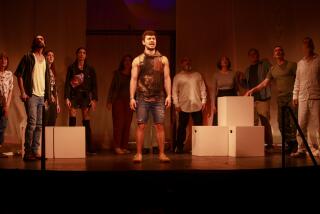It’s rough going for ‘Deep Waters’
- Share via
A scene depicting a gay Muslim roiled the currents beneath Cornerstone Theater’s latest production, “A Long Bridge Over Deep Waters.”
The show, which plays Thursday through Sunday at the Ford Amphitheatre, is the climax of a four-year play cycle examining the faiths of 10 local communities: Tongva Indians, Catholic immigrants, Jews, African American Christians, Buddhists, atheists, Bahais, Hindus, Muslims and religious believers among the gay community.
The narrative moves from one group to another, with overlapping links. Groups are introduced in the order “in which they became prominent in the L.A. faith landscape,” says Cornerstone’s literary manager Scott Horstein.
The play’s creators decided the establishment of the Islamic Center of Southern California in 1953 was the Muslim beachhead, and the founding of the gay-oriented Metropolitan Community Church in 1968 was the equivalent in gay religious circles. That placed the play’s segments devoted to Muslims and gays side by side.
To create a link between the two, playwright James Still wrote a scene in which a discussion among young women about wearing Muslim head scarves is interrupted when the bruised brother of one of the women arrives. At first he pretends he’s the victim of an anti-Muslim hate crime. Later he acknowledges he was targeted because he’s gay.
Some Muslims who were advising the show -- or in it -- objected to the scene and to depicting a gay Muslim.
The first actress playing the sister, Sondos Kholoki, said her casting “forced me to do a lot of research to see what the religion says. I don’t see homosexuality as having a part in the religion” -- although “homophobia and hate crimes have no room in the religion either.” Her unease with the scene prompted her to withdraw from the role, she said, adding that a conflict with an out-of-town family wedding also provided “a nice excuse” for her departure.
Kholoki’s husband, Baraa Kahf, also withdrew from a small role. Because of concerns raised by Kholoki, Kahf and other Muslims, a four-hour-plus meeting was held to discuss the scene.
Soon thereafter, the second Muslim actress cast as the sister also withdrew from the cast, reportedly for similar reasons. She did not return a Times call.
With no other Muslims stepping forward to take the sister’s role, an Arabic Christian woman was cast.
A similar clash had arisen with Cornerstone’s Muslim-specific production earlier in the cycle. The group had commissioned a play, “Ten Acrobats in an Amazing Leap of Faith,” that had a gay Muslim character. It wasn’t produced for unrelated reasons. When it was replaced in 2003 with a contemporary adaptation of “You Can’t Take It With You,” using Muslim characters living in L.A., adapter Peter Howard decided to include a gay couple among the characters.
A number of Muslims protested, and the company eventually retreated and cut the gay references. “It was important to keep everyone in the room,” artistic director Bill Rauch says.
Company officials say the cast of “Long Bridge” includes three gay Muslims. Ramy Eletreby, 24, plays the brother. “I consider myself a good Muslim,” he says.
But the heated company meeting has colored his views on his religion, he says. “A lot of people making hurtful remarks were people I’ve known my whole life. I’ve started to doubt my future with the faith.”
More to Read
The biggest entertainment stories
Get our big stories about Hollywood, film, television, music, arts, culture and more right in your inbox as soon as they publish.
You may occasionally receive promotional content from the Los Angeles Times.










